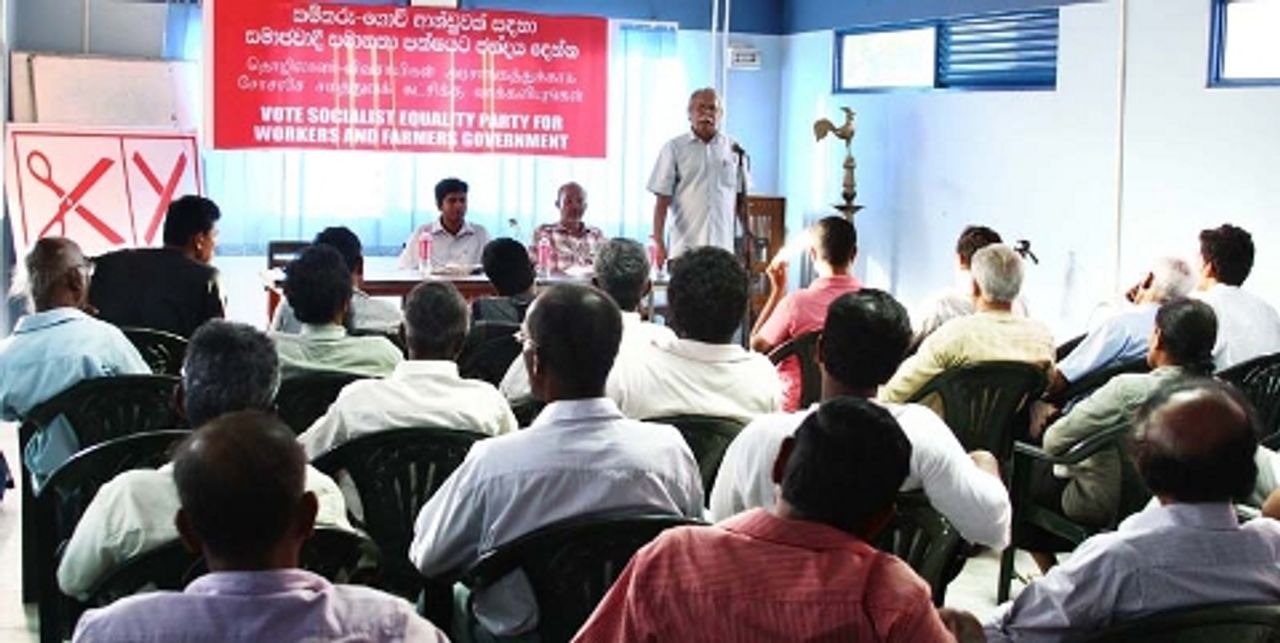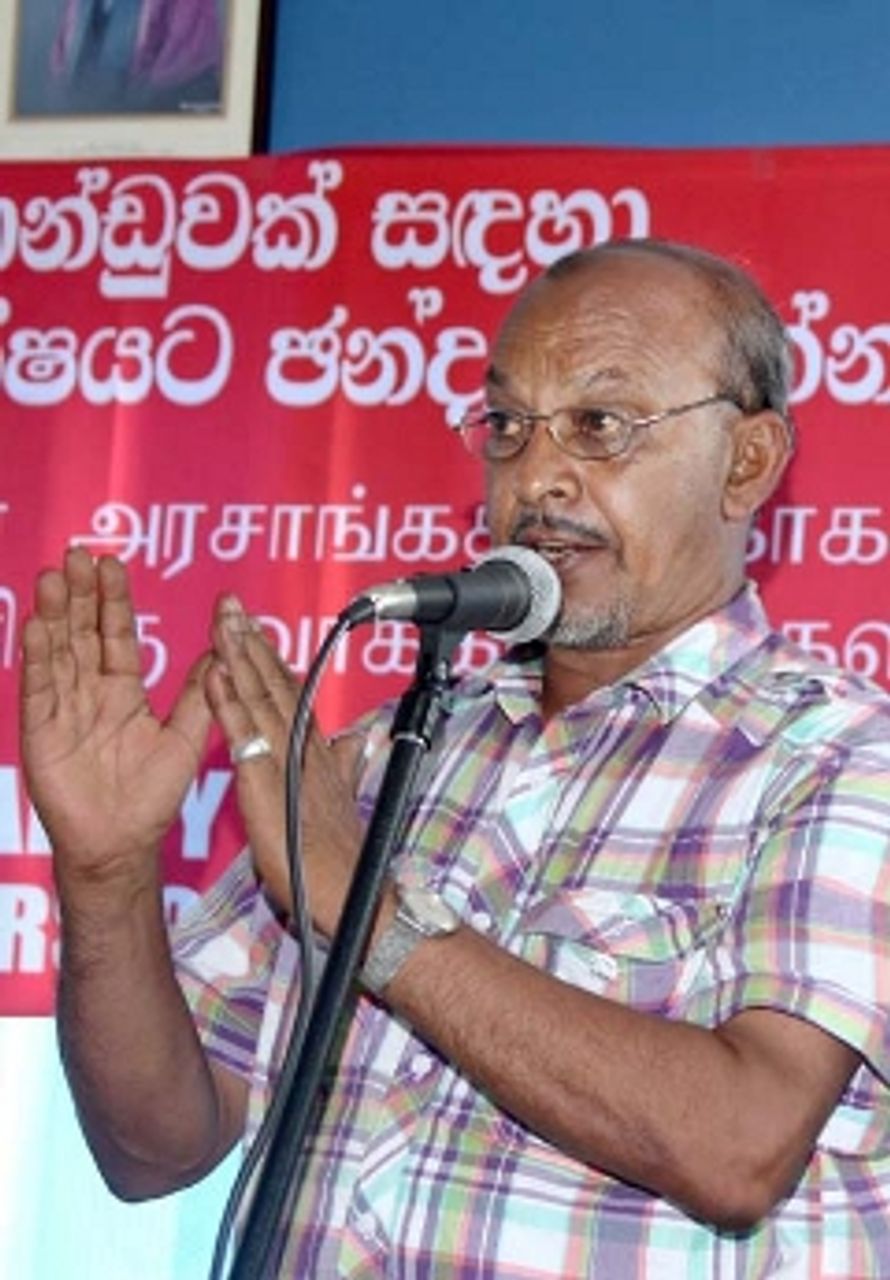The Socialist Equality Party (SEP) and International Students for Social Equality (ISSE) in Sri Lanka held a successful public meeting in the Kegalla city centre last Sunday. The first in a series of SEP meetings for the Sabaragamuwa Provincial Council elections on September 8, it was attended by bank, postal, public administration and private sector workers, youth and students.
SEP-ISSE teams campaigned for the meeting among different sections of the working class, including Tamil-speaking rubber plantation workers and Bogala graphite miners, as well as farmers, housewives and unemployed youth. Thousands of leaflets outlining the party’s election program, and other material from the World Socialist Web Site, were distributed.
 A section of the Kegalla meeting
A section of the Kegalla meetingSri Lankan ISSE convenor Kapila Fernando chaired the meeting. He began by explaining that the SEP election campaign was not just aimed at winning votes but at providing an international socialist perspective for the working class. Rising youth unemployment, escalating cuts to the education system and other social attacks, he said, could be answered only through the fight for a socialist program and the building of a revolutionary party of the working class to provide leadership to all the oppressed layers of society.
Ananda Daulagala, who heads the SEP’s list of 21 candidates, delivered the main report. He said President Mahinda Rajapakse’s administration would attempt to win the elections through a “blatant abuse of state resources and political power.” It would then “fraudulently claim that the people are behind it and attempt to intimidate the growing popular resistance to its policies.”
 Ananda Daulagala
Ananda DaulagalaDaulagala warned that the government, which restarted the war against the Tamil minority in 2006, was unleashing an economic war against the working people of all communities. “The Rajapakse government has no reservations in implementing the austerity program demanded by the IMF [International Monetary Fund] to drastically cut social spending and freeze workers’ wages,” he said.
Daulagala explained that Rajapakse’s economic measures flowed directly from the deepening crisis of the world capitalist order. “The ruling classes in every country are being forced by this crisis to impose catastrophic burdens onto the working class and the poor through drastic measures that wipe out social gains made during a half-century of self-sacrificing struggles.”
The candidate said workers were not ready to accept these attacks without a fight. This was demonstrated in the worldwide mass struggles over the past 18 months—from North Africa and Middle East to the centres of world capitalism in the US and Europe. Daulagala warned that although the Tunisian and Egyptian masses had toppled decades-old pro-imperialist dictatorships, the US and other imperialist powers were intervening to reestablish puppet regimes.
“It is abundantly clear,” Daulagala said, that “without a socialist and internationalist perspective and a revolutionary leadership the working class cannot win the struggle against capitalism.” The only organisation fighting for this program, he said, was the International Committee of the Fourth International, the world Trotskyist movement, and the World Socialist Web Site.
“The struggle of the SEP, together with our co-thinkers around the world, is to educate and rally the working people and youth on the basis of this perspective. This is the message we take to the people in this election campaign.”
Addressing the meeting, SEP general secretary Wije Dias said it would have been “a new experience” for those attending their first SEP meeting to hear a detailed analysis of the world situation. “Even a mention of these world developments is totally absent from the election platforms of all the other parties,” he said.
“We begin our analysis of the situation in Sri Lanka and South East Asia based on an understanding of the world situation, because we live in an era of globalised economy and world politics. The class struggles in this region, therefore, must be evaluated within the context of the international scale of struggles by the working people and youth against world imperialism and its local bourgeois agents and their ex-radical lackeys.”
Dias explained that the ongoing financial crisis since 2008 and the aggressive neo-colonial policies of the US and other imperialist powers were a manifestation of the death agony of the entire capitalist system.
“The year 2011 began with an offensive by working people and youth in Tunisia and Egypt to drive out the long-standing dictators that ruled those countries as agents of imperialism. There is no reason to believe that the working people in this region would take a different path against the ruling class and its government here.
“At the same time, we, as the revolutionary party of socialism, recognise that the crucial problem faced by the insurgent masses of those countries was the crisis of socialist perspective and leadership.” The SEP’s election intervention, Dias continued, was in order to build such a revolutionary leadership, based on Trotsky’s Theory of Permanent Revolution.
A lively question and answer session followed these reports. One youth asked about the SEP’s attitude toward a program to “unite all left forces.”
Dias explained that the working class everywhere, and in Sri Lanka in particular, had suffered bitter defeats by following this false line. One such experience, he said, was the formation of the United Left Front in 1963 by the Lanka Sama Samaja Party, the Communist Party and the Mahajana Eksath Peramuna of Philip Gunawardena.
“That left front,” Dias said, “was the launching pad for the bourgeois coalition government in 1964 that played a crucial role in destroying the political independence of the working class and which brought tragic consequences for the masses as a whole.”
The urge for unity among the masses required a revolutionary alliance of the workers and the rural poor against capitalist rule on the basis of an international socialist program, Dias said. “This unity can be forged only through a political struggle, carried out by the revolutionary party, to expose and defeat all those parties and groups that work, in various ways, to tie the working class, to the ruling class.”
Dias explained how Janatha Vimukthi Peramuna, which posed as an alternative to the treacherous old “left” parties, had followed the same trajectory as the United Left Front. It joined Kumaratunga government in 2004 and then backed the coming to power of Rajapakse, who intensified the brutal war against the Tamil people.
Dias added that the pseudo-left Nava Sama Samaja Party and the United Socialist Party appeared on political platforms with the right-wing United National Party in the name of opposing Rajapakse’s government. “They all claim to be ‘left’ fronts,” Dias said, “but in reality the aspirations of the working people and youth are left behind by these fronts.”
Detailed answers were given to questions on the SEP’s attitude to the Tamil question, the Rajapakse government’s “Lessons Learnt and Reconciliation Commission,” the role of the unions and how the SEP would win mass support. A number of workers and youth remained after the meeting for further discussion on the party’s program.
